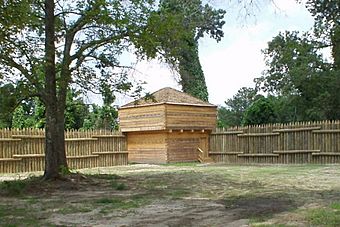Fort Mitchell Historic Site facts for kids
|
Fort Mitchell Site
|
|

A reconstruction of the stockade and a blockhouse.
|
|
| Nearest city | Fort Mitchell, Alabama |
|---|---|
| Built | 1813 |
| NRHP reference No. | 72000178 |
Quick facts for kids Significant dates |
|
| Added to NRHP | June 13, 1972 |
| Designated NHL | June 21, 1990 |
The Fort Mitchell Historic Site is a special park and an archaeological site in Fort Mitchell, Alabama. It was named a National Historic Landmark in 1990, which means it's a very important place in American history.
At the park, you can see a rebuilt version of the fort from 1813. This fort was a key military spot for the United States during the Creek War. There's also a museum with exhibits about the fort's past. You can find old carriages, a restored log home from the 1800s, and a visitor center.
Next to the fort is the Chattahoochee Indian Heritage Center. It has a special flame memorial for the Creek Nation. Signs there tell the story of the Creek War of 1836 and how the Creek people were later forced to move on the Trail of Tears. The site also has historic burial grounds.
Contents
Fort Mitchell's Story
The Fort Mitchell Historic Site shows us three different times in the relationship between the Creek Nation and the United States.
The First Fort (1813)
The first Fort Mitchell was built in 1813. It was an outpost during the Creek War and the War of 1812. The fort was named after David Brydie Mitchell, who was a governor of Georgia. This fort was part of the United States' plan to expand its land.
The United States fought against the Red Sticks, a group from the Creek Indian Nation. The Red Sticks did not want Americans to take their land. The US won the war. Because of this defeat, the Creek people had to give up a huge amount of land. In 1814, they lost 21 million acres (about 85,000 square kilometers) in Georgia and Alabama.
A Trading Post and Post Office (1817-1820)
After the war, Fort Mitchell became an "Indian Factory" in 1817. This was a trading post run by the US government. It was a place where Native Americans and government agents could trade goods. A post office also operated here from 1818 to 1820.
Rebuilt Fort and Indian Agent (1821-1840)
In 1821, Colonel John Crowell became the US Indian agent for the Creek people. He was appointed by President James Madison. Colonel Crowell replaced David Brydie Mitchell, who had been involved in a scandal.
By 1825, the US Army rebuilt the fort. Soldiers from the Fourth Infantry stayed there until 1840. This was after the "Indian Removal" of the late 1830s, when many Native American groups were forced to leave their homes.
Treaties and the Second Creek War (1836)
The last period of the fort's history shows the government trying to keep its promises from treaties. These promises included payments and supplies to the Creek Nation.
Fort Mitchell had soldiers during the Second Creek War in 1836. This war happened in Alabama because the state tried to control Creek land. After this war, most Creek people in Alabama were forced to move to Indian Territory (which is now part of Oklahoma). Those who stayed in Alabama had to give up their tribal membership.
Discoveries and Memorials
In 1971, archaeologists started digging at the old fort site. They found graves, parts of a hospital, and remains of the fort, barracks, and storage rooms. A report about these findings was published in 1974. In 1990, the site was officially named a National Historic Landmark.
In 1987, the Fort Mitchell National Cemetery was created here. It is a burial place for United States veterans from the Southeast and Gulf Coast regions.
Images for kids
See also
- List of National Historic Landmarks in Alabama
- Fort Mitchell National Cemetery







